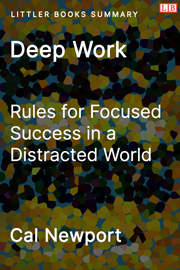Book Description
A self-help book that offers practical strategies for cultivating focus and achieving peak performance in today's distraction-filled world.
If You Just Remember One Thing
To produce high-quality work and gain a competitive edge, you must deliberately protect your focu... More
Bullet Point Summary and Quotes
- Deep work is the ability to completely focus on a cognitively demanding task. It is intentional and requires preparation to overcome distractions, and it is different from being "in the zone," which often happens by chance.
- Deep work is a superpower in the competitive 21st century. It is not only essential for productivity, but also for personal satisfaction and fulfillment.
- Strategies to achieve deep work:
- The monastic approach: eliminate distractions by secluding oneself.
- The bimodal approach: set a defined period for work and free time.
- The rhythmic approach: form a habit of working for 90-minute (or another length of your choosing) blocks.
- The Journalistic approach: use all unexpected free time for deep work.
- Define your space: specify a designated place to work (J.K. Rowling worked in a hotel to help her focus).
- Define boundaries: set periods of time during which you won't respond to messages.
- Sustain your body: have a good diet and exercise habits.
- Embrace boredom: avoid distractions during downtime. The ability to focus on nothing can be a valuable skill, as it allows your mind to recharge and come up with new ideas.
- Drain the shallows: reduce or outsource shallow, unimportant tasks. Completing small tasks may make us feel productive, but it prevents us from truly focusing.
- Intense focus on a specific skill builds up myelin around relevant neurons, making the corresponding circuit fire more effectively, leading to better performance.
- Multitasking harms productivity. People often believe that doing multiple tasks simultaneously is the best way to use time effectively, but research shows otherwise.
- A 2009 University of Minnesota study found that switching between tasks causes us to lose focus on the second task and affects performance negatively.
- A study by McKinsey revealed that the average worker spends most of their time on online communication and internet surfing, leaving only a small amount of time for important tasks.
- Avoid being distracted by notifications. They hurt your focus even if you're not directly addressing them.
- Our brains are wired to easily get distracted for evolutionary purposes (movement = food or threat). However, productive meditation (using unproductive moments, e.g., waiting in line, to intensely think about a specific problem) can help rewire the brain and improve focus.
- It's important to be mindful of our intentions when using technology and social media, and to use them selectively. To determine if social media is worth the time and distraction, try quitting for 30 days and evaluate if life was better without it.
- Plan activities for your free time with activities that do not involve digital devices, such as reading, exercise, or quality time with loved ones. This helps to revitalize the mind and body.
- To avoid feeling exhausted and unproductive, it is important to schedule everything (work and personal time) into blocks of at least 30 minutes. It's okay to rearrange the blocks as necessary, because the point is not to follow the schedule rigorously, but to be intentional with our time.
Deep Work: Resources
- Download this summary and 170+ other top nonfiction book summaries in one book (PDF, eBook, DOCX)
- Buy the book
